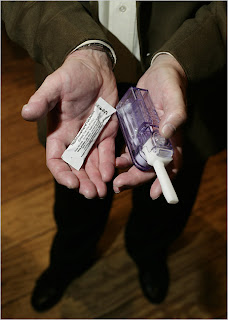 I hope all of you are having a great Christmas season. I spent my Christmas here in Boston to avoid an expensive flight home to L.A. Oh well, I'm ready to kick off the new year anyway.
I hope all of you are having a great Christmas season. I spent my Christmas here in Boston to avoid an expensive flight home to L.A. Oh well, I'm ready to kick off the new year anyway.I was searching for some diabetes blogs when I came across this transcript of a radio broadcast on NHPR titled: "Diabetes Screening Isn’t Always Beneficial"
In the report, a researcher states that "one of her concerns about diabetes screening is the potential rush to medicate." Though I find myself agreeing that premature medicating is certainly a cause for concern, I was still rather upset with a previous statement that we should be pursuing these screenings only "on the basis of having good studies that show that we help them in terms of making them live longer or live better."
I think most would agree that detecting signs of diabetes early certainly wouldn't do any harm.
She does go on to say that "the symptoms themselves lead people to raise the issue with their doctors and get the condition identified in a timely manner." But I would contend that waiting for symptoms to become an issue big enough to bring up with your doctors is a bit too late. I know in the case of type 1 diabetes, those symptoms are NOT anything anyone would wish for. I would think that for type 2 diabetes, the long-term affects of long-term exposure to high blood glucose is definitely something people would also want to avoid.
The way I view this is that screening for diabetes will help raise awareness in those who don't have it yet. If and when they do develop diabetes, they will at least be more prepared than having no exposure to what diabetes is.
 Well, we've had a few snowstorms in the past week and Boston is freezing cold. As tempting as it is for a Southern Californian like me to naturally run out into the snow and make snow angels wearing nothing but a t-shirt and shorts, I've come to learn of the pain that the cold and wet brings afterwards.
Well, we've had a few snowstorms in the past week and Boston is freezing cold. As tempting as it is for a Southern Californian like me to naturally run out into the snow and make snow angels wearing nothing but a t-shirt and shorts, I've come to learn of the pain that the cold and wet brings afterwards. what happens when taking too much insulin after a big meal
what happens when taking too much insulin after a big meal






 "Pfizer, the world’s biggest drug company, flopped
"Pfizer, the world’s biggest drug company, flopped 




 There was an article in the Boston Globe today that was written by Ranch Kimball, the president and chief executive of Boston-based Joslin Diabetes Center, about the
There was an article in the Boston Globe today that was written by Ranch Kimball, the president and chief executive of Boston-based Joslin Diabetes Center, about the 





















